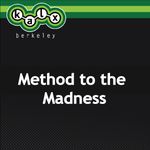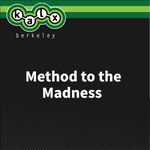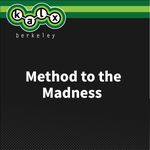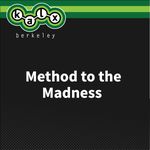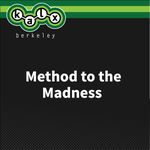Mohamed Shehk
Lisa Kiefer: [00:00:01] You're listening to Method to the Madness. A biweekly public affairs show on K-A-L-X Berkeley celebrating Bay Area innovators.
Lisa Kiefer: [00:00:12] I'm your host, Lisa Kiefer. And today, I'm speaking with Mohamed Shehk, co-director and media and communications director of Critical Resources. Welcome to Method to the Madness.
Mohamed Shehk: [00:00:28] Thank you for having me.
Lisa Kiefer: [00:00:29] I've been hearing a whole lot with the upcoming presidential election and all the debates, about prison reform. I find it kind of interesting that for the past over 20 years, your organization has said "forget reform, we need to abolish prisons."
Mohamed Shehk: [00:00:43] Yes. Critical Resistance was founded in 1998. It was founded in Berkeley. There was a conference called Critical Resistance Beyond the Prison Industrial Complex.
Lisa Kiefer: [00:00:53] Yes. And you had a lot of heavy hitters, Angela Davis.
Mohamed Shehk: [00:00:55] Angela Davis was one of our co-founders,.
Lisa Kiefer: [00:00:57] And, Ruth Wilson Gilmore!
Mohamed Shehk: [00:00:59] And we're actually doing an event with Ruthie down in L.A.. Yeah. So we began using a term that was actually coined by Mike Davis, the prison industrial complex. And it was a way to begin thinking about the interrelated systems of imprisonment, policing, surveillance and other forms of state violence and control. Really looking at this system as being built intentionally to control, repress and inflict harm and violence in communities. So if we understand that its purpose is to control communities, then we don't want to fix it. Right. We want to chip away at its power. We want to abolish it. So we really popularized the notion of prison industrial complex abolition. And for the past 20 years, we've been working on various projects and campaigns toward eliminating the prison industrial complex in our society.
Lisa Kiefer: [00:01:51] So of all the candidates, who do you think is most onboard or at least understanding of what your strategy is toward prisons?
Mohamed Shehk: [00:02:00] It's really interesting with the current presidential candidates that have approached criminal justice reform in a variety of ways. I mean, you just had Bernie Sanders release a platform that actually picks up a lot of some of the concepts and community based approaches rather than continuing to invest and waste millions and millions and millions of dollars into the system of policing, into imprisonment. What are the reforms that appear to be liberal or progressive but are actually entrenching the system?
Lisa Kiefer: [00:02:36] Right. They're kind of co-opting.
Mohamed Shehk: [00:02:37] Yeah. After the death of Mike Brown and Eric Garner back in 2014 with the, you know, upsurge of Black Lives Matter and the enormous amount of attention being focused on policing, and you had an array of reforms being discussed, such as body cameras, such as, more training for police officers. And we see that these kinds of reforms are actually pouring money into the system of policing. They're expanding the role of policing. We're giving surveillance technology to policing. Right. So these reforms aren't actually chipping away at the power, but actually legitimizing and entrenching the system of policing itself. So these are the kinds of reforms that we want to be cautious of and use this framework of thinking about abolitionist reforms vs. reformist reforms. What are the reforms that are actually cutting away resources from the systems that we're fighting rather than continuing to waste investments into these systems.
Lisa Kiefer: [00:03:36] And so what are some of the strategies that you are using in your organization? And you're located in four cities. You're headquartered in Oakland in the Temescal. You're in New York City, L.A. and Portland.
Mohamed Shehk: [00:03:48] Yes. Our national office is based in Oakland. We are a nonprofit organization and we function primarily through our chapters and our chapters, the ones that you named, our volunteer members really make up the bulk of the organization and we work with them and they decide what local projects and campaigns are most relevant to the political geography that they're operating in, to attack the prison industrial complex. So, for instance, in Portland, we started a campaign called Care Not Cops. Initially, that campaign was really focused on cutting policing away from mental health crisis response. We want to divest resources away from policing, take money away from the police budget and put that into community based and user determined mental health resources. One strategy is to really focus on the city budget and to use that as a method to organize communities and to say these are actually where we want our resources going, not continuing to go into the Police Bureau's budget. We use a variety of different strategies and tactics, so we do a lot of media and communications work to kind of shift how we understand safety, how we understand what strong and healthy communities actually look like. We do a lot of work around the legislative realm. We work with decision makers and also put pressure on decision makers to put forth policies that are actually in line with what we're advocating for.
Lisa Kiefer: [00:05:28] So let's talk about what you're doing in the Bay Area... Urban Shield, for one thing. Can you talk about that a little bit and some of the other successes you've had locally?
Mohamed Shehk: [00:05:36] Yeah. Thank you for raising that. Critical Re sistance along with a number of other organizations, including the Arab Resource and Organizing Center, Chicano Moratorium Coalition, the American Friends Service Committee. We're part of a coalition called the Stop Urban Shield Coalition. And we came together to put an end to Urban Shield, which was the world's largest SWAT training, and also included a weapons expo. That organizing happened for five plus years. We built a grassroots campaign to essentially pressure and empower the Board of supervisors in Alameda County to say to the sheriff, no, we do not want this kind of program anymore. Urban Shield was justified under the guise of emergency preparedness. Right. And so the sheriff would say, well, we need this kind of program because of all these different kinds of emergencies. But obviously, just as with many programs that came after 9/11, it was funded through and bolstered by the logic of militarization and counter-terrorism and was effectively a program that endorsed war on black and brown communities. So last year, the Board of Supervisors made a decision to end Urban Shield. They said after this year, Urban Shield is no longer. Then this year, a gain, after some kind of foul play by the sheriff to attempt to kind of reverse their decision and even just ignore that it actually happened. Earlier this year, they reaffirmed their decision and Urban Shield was effectively defunded.
Lisa Kiefer: [00:07:08] Does that money then go to the programs that you are backing?
Mohamed Shehk: [00:07:12] Yes. So we have been working alongside various city and county agencies to really put in place what emergency preparedness and disaster response looks like. So one of the things that we did with the Alameda County Board of Supervisors is part of their decision to end Urban Shield was to put together a task force to say, okay, let's actually look at how this money could be funded. And they adopted a number of recommendations, which was about 60 recommendations that called for things like no more SWAT centered scenarios. You know, we want inclusive programs and transparency that include community members in the planning and the implementation. And so these recommendations were adopted. We also took them to San Francisco because San Francisco is the fiscal agent of this money that's coming from the federal government. And they also looked and adopted many of the recommendations. And so for what comes next, we are hopeful that it really embodies the kind of program, the kind of framing that we were after.
Lisa Kiefer: [00:08:23] Can you tell me also about the project called Oakland Power Projects?
Mohamed Shehk: [00:08:27] So there was a coalition, the Stop the Injunctions Coalition, that put an end to gang injunctions in Oakland. It was the first instance of a city in the United States ending gang injunctions as a result of grassroots mobilization and pressure. And so after that, we said, OK, we ended gang injunctions. This is tremendous. What do we want to do next? So we started surveying and interviewing Oakland community members around things like what does safety look like to you? Do you have instances where you feel like you need to call the cops? What kind of investments do you want to see in your community? And so we compiled all of these interviews. We started picking through them and found a common theme which was around health related emergencies and people saying, when these emergencies happen, I don't want to call the cops, but they're the only options that I have.
Lisa Kiefer: [00:09:19] Give me an example of something like that.
Mohamed Shehk: [00:09:21] So it could be someone gets in a car accident. Someone is having a or experience as someone else, having a mental health crisis or someone just badly cuts themselves or injured themselves. They have to call 9 1 1. And in many instances, the police show up and either don't really help in what's often the case or exacerbate the situation.
Lisa Kiefer: [00:09:45] By criminalizing it.
Lisa Kiefer: [00:09:46] Exactly. What we did is we got together a number of health workers from counselors to kind of traditional like EMT as doctors, nurses, acupuncturists, the whole range, right? Street medics and we said, okay, now we want you to come up with different resources and come up with a number of different workshops that you can provide to communities on knowing your options when situations occur. They did exactly that and it was really powerful. They came up with three different tracks. One was acute emergencies. Another was mental health and behavioral crises. And another one was chronic illnesses and also tied in opiate overdoses. And so we began to offer these workshops to different community organizations, to places of business, to community groups, neighborhoods. And the workshops are really geared toward ending our reliance on policing by building up our know how and our capacity to be able to respond to situations in our communities.
Lisa Kiefer: [00:10:54] You must've gotten a lot of resistance because it sounds very radical when you say abolish prison.
Mohamed Shehk: [00:10:59] We really want to understand the root causes of harm and violence. Right. Because oftentimes what the status quo has been is that when something happens, we're reactive and we respond. And oftentimes what that looks like is targeting black and brown people and putting them in cages. So if we really are to want to address harm and violence in our communities, social injustices, we have to understand the root causes. And we have to begin to see how we can transform the underlying conditions that gave rise to harm and violence in the first place. When we say prison industrial complex and when we say prison industrial complex abolition, we know full well that just taking the prisons away from society is not going to be the end of the game. Right. We have to understand that prisons don't exist in a vacuum. Policing does not exist in a vacuum. That we're gonna have to also look at the ways that different dynamics in society are integral to the prison industrial complex. And so changing social conditions and transforming the ways that we relate to each other is fundamental to understanding and achieving abolition.
Lisa Kiefer: [00:12:21] If you're just tuning in, you're listening to Method to the Madness, a bi-weekly public affairs show on K A L X Berkeley, celebrating Bay Area innovators. Today, I'm speaking with Mohammed Scheck, the media and communications director of Critical Resistance.
Lisa Kiefer: [00:12:43] And you've been successful. You're stopping a prison from being built locally here in San Francisco, is that correct?
Mohamed Shehk: [00:12:49] Yeah. So one of our one of our campaigns here in the Bay Area is the No New S.F. Jail Coalition. What that essentially is, is the sheriff back in 2013 or so or even a little bit before, but that's when the coalition really came together. The sheriff wanted to build a replacement jail to one that already exists at 850 Bryant Street, which is known as the Hall of Justice in San Francisco. The interesting thing about the Hall of Justice is that nearly all of San Francisco, it's it's unanimous that that building needs to be torn down because it's seismically unsafe, it's decrepit, it's falling apart. And the sheriff wanted to build a replacement saying that that was his only option. What we did was we formed a coalition with a number of other organizations and effectively put a halt to that plan. So in 2015, we got the supervisors to vote unanimously and say we don't want to build a new jail. We actually want to look at alternatives. We want to look at ways to reduce the jail population while building up resources and looking at investments that actually support people coming back home and can support communities in need where we don't have to respond by criminalizing.
Lisa Kiefer: [00:14:08] So you guys are active participants in this new solution?
Mohamed Shehk: [00:14:12] Yes, absolutely. And so right now, our effort is to actually close the jail at 850 Bryant Street. That's that's kind of the main thrust that we're working on right now. We do have one supervisor who has stepped up and is willing to put forward legislation toward shutting the jail this year. What we're looking at is opposing different kinds of reforms and different proposals that would actually legitimize other forms of punishment as a response. So like they'll say, OK, we're going to close this jail, let's put everyone on electronic monitoring and we're like, no, we don't want to expand surveillance. We don't want to expand the jail beyond its reach, which is essentially what electronic monitor shackles are. We don't want to move people to Alameda County, to Santa Rita jail. We want people to remain close to their families, close to their communities. And we don't want to reopen new jails or reopen old jails and refurbish them. So it really is about looking at what are the resources that we can build, what already exists, and then what do we need to build up around. Housing is a big one. I mean, you have nearly 30 percent of the jail population that was house less before they were arrested and booked. You have enormous racial disparities in the jail population in San Francisco,.
Lisa Kiefer: [00:15:34] And in the nation.
[00:15:36] Yeah, but I was going to say even more so than the rates that we see across the country where the city of San Francisco has about a 4 percent black population that is on the decline and black people make up 80 percent of the jail population. So you look at that enormous disparity and say what's really going on wrong? Right? What is, what's wrong? You have a significant number of people that face mental health issues and substance abuse. Just looking at these numbers, we can easily begin to say a new jail is not necessary. We do not need to be locking these people up. We can easily be thinking about other kinds of investments that would actually strengthen communities and make new jails obsolete.
Lisa Kiefer: [00:16:16] Tell me how you're getting funding for these programs, because they sound like they might be pretty expensive.
Mohamed Shehk: [00:16:22] We do fund raising. We are actually fortunate to be majority grassroots funded. So about 65 percent of our of our funding comes from people, you know, donating monthly, giving us onetime gifts. We hold events, you know, fundraising benefits. In terms of the funding for the programs, were advocating for those to be taken away from the police, sheriffs, other agencies that are about criminalization. And we want to divert funding away from them into the resources that we want and need.
Lisa Kiefer: [00:16:57] Have you seen an upsurge in interest over the 20 years that you guys have been working hard at this? It seems like there's more of an opening now.
Mohamed Shehk: [00:17:05] We definitely have seen a tremendous upsurge in the popularity and interest in just in the concept of abolition. Right. What we've done and other community members, other organizations have done is to really make this concept common sense. Because you mentioned earlier that, you know, this can be kind of a scary radical concept for people. One of the things that we really do is to show how practical it is. We show the the way that abolition can be worked on, can be practiced on a day to day level.
Lisa Kiefer: [00:17:38] How did you personally get involved with Critical Resistance. How long have you been there?
Mohamed Shehk: [00:17:44] I've been involved in Critical Resistance for just over five years now. The way that I came to Critical Resistance was really beginning to recognize the role of policing and imprisonment in this country. My background as a Palestinian, as someone who has long been involved in organizing and in different activism around Palestine, solidarity, began to really look at what are the intersections between what's happening there and what we're experiencing here. When you see that the state of Israel imprisons such a significant portion of the Palestinian population, the aid that they get from the U.S. government in order to do so, that helps them and and allows them to do so. And then the ways that Israel really practices its tools of repression on the Palestinian population. So for many that follow this issue closely, you might know that Gaza is essentially a laboratory experiment for the state of Israel to test different tools, tactics, technologies, and then they export those technologies to governments all around the world by billing them as battlefield tested.
Lisa Kiefer: [00:19:03] And I assume we are one of the recipients?
Mohamed Shehk: [00:19:05] Absolutely.
Mohamed Shehk: [00:19:06] And that's kind of what we get back for our military aid that we provide. When you look at this, the interconnections between policing and imprisonment there and in other places with the systems here, you begin to see that they're playing a fundamental role in whatever issue that you work on, whether that be environmental justice, whether that be public education, climate change, women's rights, LGBTQ rights and liberation, the prison industrial complex is tied to all of those issues. The prison industrial complex is fundamentally patriarchal. It's fundamentally toxic to the environment. It's fundamentally why we have such a disinvestment from public education. Right. Because of how many how much resources are being squandered on this enormous system. That for me, became very central in the kind of activism and organizing that I wanted to do.
Lisa Kiefer: [00:20:02] Are you also working inside prisons?
Mohamed Shehk: [00:20:05] Yes. So our Oakland chapter has a inside, outside working group. Their primary drive is to communicate with people on the inside and to share resources on how to support organizing that's happening. We also do a lot of work in communicating with people on the inside to help inform the work that we're doing out here. We have a reading group that we do where we read articles from a newspaper that we published with people on the inside and then share and give reflections and circulate those. We publish a newspaper called the Abolitionists that goes to now over 7500 people in prisons, jails and detention centers across the country. Much of that content is actually composed and written by people that are currently or formerly imprisoned.
Lisa Kiefer: [00:20:55] How about education programs inside?
Mohamed Shehk: [00:20:58] We don't do education programs like formally, although we do share a lot of educational resources and organizing resources with folks on the inside. One of the main campaigns that we supported is the California Prisoner Hunger Strikes that happened. And so this was an effort that was organized by and led by people that were in prison in solitary confinement at Pelican Bay State Prison. They had a list of demands and they initiated a hunger strike effectively aimed at ending solitary confinement, improving conditions, getting rights, ending discriminatory and criminalization policies. That hunger strike in 2013 reached over 30000 people in California prisons that joined in solidarity.
Lisa Kiefer: [00:21:45] And what was the outcome?
Mohamed Shehk: [00:21:46] That had a huge impact. It gained national and international attention and drew widespread condemnation on the practice of solitary, of locking someone up in a windowless cell for 23 hours a day. Because of that attention, the United Nations rapporteur on torture said that solitary confinement is a form of torture. The California legislature held a number of hearings on the use of solitary confinement. Mow in the midst of this happening, there was also a lawsuit that was initially brought by the prisoners themselves and then was taken up against the California Department of Corrections and Rehabilitation, CDCR. That was then taken up by a number of lawyers and legal organizations, including the Center for Constitutional Rights and that lawsuit in 2015 ended in a settlement by which the prisoners achieved a tremendous victory and effectively ended indefinite solitary sentences, which a lot of the prisoners were being held for five, 10, 15, 20 years in solitary confinement and were were put in indefinitely. It also greatly reduced and restricted the rationale by which someone could be placed in solitary confinement. Yeah, so we supported that as part of a coalition, the prisoner hunger strike solidarity coalition and Critical Resistance specifically kind of played the media house for the campaign.
Lisa Kiefer: [00:23:25] I recently read about your new headquarters location in the Temescal, which used to be Baby World, and it's such an interesting story. Would you mind sharing that?
Mohamed Shehk: [00:23:35] Yeah, we had already been talking about needing to find a new location because the place that we're currently at, which is in downtown Oakland, the rents have been rising exponentially. And so we said to ourselves, we really have to start looking. This is just unsustainable. During the same time, some of us, you know, just through kind of personal and political connections, were having conversations with with other folks and the family that owned the building, the Cabello family, we had conversations with their daughter, Danya Cabello, and realized that this building was for sale. When we found that out, we jumped onto the opportunity and reached out to a loyal donor, Rachel Gilman, who is part of an organization called Resource Generation, which is essentially an organization that seeks to bring in people with wealth in order to redistribute their wealth to social justice causes. In talking with Rachel, we kind of put that on the table and just had kind of a frank conversation. This is what we're thinking. What do you think? And she loved the idea.
Lisa Kiefer: [00:24:43] She's only twenty nine.
Mohamed Shehk: [00:24:44] Yeah.
Lisa Kiefer: [00:24:45] She said herself that she thinks of giving as a "way to help up end the forces of capitalism, patriarchy, and white supremacy that underlie her very own inheritance." And she said, "I believe ending this economic system that creates such drastic wealth inequality is necessary for all people's humanity and dignity, including my own and that of my family." I think this is revolutionary.
Mohamed Shehk: [00:25:10] Yeah. Absolutely. And it's a beautiful space. We're in the process now of renovating the building to serve community organizations that are operating in the Bay Area. We want it to be a hub for social and racial justice organizing of all stripes. We want it to be a place where organizations and communities that are fighting to resist gentrification can have a place to hold their meetings, to have events, fundraisers. So we really want it to serve the community and to really pay homage to the legacy of organizing in Oakland.
Lisa Kiefer: [00:25:46] And it's kind of interesting because the owners, the Cabello's, their family had suffered under Pinochet in Chile. So they there was just all this serendipity that happened between you and them.
Mohamed Shehk: [00:25:57] Yeah. No, absolutely. They come from a very kind of rough political history and also are very much tied to resistance movements. Right? So they were part of the first suit against basically the horrors of the Pinochet regime, the School of the Americas, and the role that the U.S. played in supporting the horrors of Pinochet.
Lisa Kiefer: [00:26:21] I did want to ask you what your greatest challenge has been in the time that you've been in this organization.
Mohamed Shehk: [00:26:28] One of the greatest challenges that we face today is the way that the prison industrial complex is shifting, how much technological innovation is going on, the ways that technological innovation is being integrated into the prison industrial complex to expand its reach. Now, this can be like the physical tools and technologies that are developed or something that isn't so tangible, but it's just as dangerous, such as predictive policing or risk assessment algorithms. These are, in a way kind of taking away the the human element, so to speak, and putting in place algorithms and technologies that are actually serving to criminalize people in an automated fashion. It's a very scary concept to think about. We really need to resist attempts to say that we're going to make the prison industrial complex better by removing the bias of humans, by introducing technology. The society that we live in is built on racial oppression, gender oppression, oppression against sex. And so technologies are not going to solve that. We have to actually begin to transform those dynamics, eradicate systems of oppression if we want to achieve liberation.
Lisa Kiefer: [00:27:50] What's coming up for your organization?
Mohamed Shehk: [00:27:52] As I mentioned, we are working on the NO NEW SF Jail effort to close 850 Bryant Street. Be on the lookout. Join our mailing list, visit our web site, sign up, because we'll be putting out information on how folks can can really plug into that fight and and close the jail. For folks in Los Angeles, we're gonna have an amazing event. Ruth Wilson Gilmore, who's an amazing, inspiring, brilliant scholar, is going to be speaking. This comes after a huge victory where we, along with the Justice L.A. Coalition, stopped L.A. County from building a, quote unquote, mental health jail. That was an enormous victory. You've been fighting jails in Los Angeles for 10 years. And we wanted to celebrate and bring our communities together. We really just encourage folks to check us out.
Lisa Kiefer: [00:28:40] What is your web site?
Mohamed Shehk: [00:28:41] criticalresistance.org
Lisa Kiefer: [00:28:43] And can people volunteer in your organization?
Mohamed Shehk: [00:28:45] Absolutely. Our Oakland chapter holds volunteer nights every Tuesday from 6 to 9 p.m. And that's in our current office. Not the not the new building, 1904 Franklin Street, Suite 5 0 4. And so come through, volunteer. We find ourselves in a very trying political moment. You know, the current presidential administration is unrelentless and attacks that it's waging on our communities, blatant racism and sexism and xenophobia that has come from this administration. We also have seen the ways that communities are resilient and resistant.
Mohamed Shehk: [00:29:24] You saw the massive energy into opposition to shut down airports in response to the Muslim ban. We see opposition from ICE raids. We also want to resist the tendency or maybe even the appeal to want to go back to how things were, because there were a lot of things wrong and violent and racist in the policies in former administrations. Rather than shy away in this political moment, actually to raise up radical ideas like abolition as the tools, as the strategies that are actually going to get us to where we want to be, to a society where we truly have equity, self-determination and freedom.
Lisa Kiefer: [00:30:10] That's a nice, positive way to end this. Thank you, Mohamed, for coming in.
Mohamed Shehk: [00:30:15] Thank you.
Lisa Kiefer: [00:30:16] You've been listening to Method to the Madness, a bi weekly public affairs show on K A L X Berkeley celebrating Bay Area innovators. We'll be back again in two weeks.
Hosted on Acast. See acast.com/privacy for more information.
